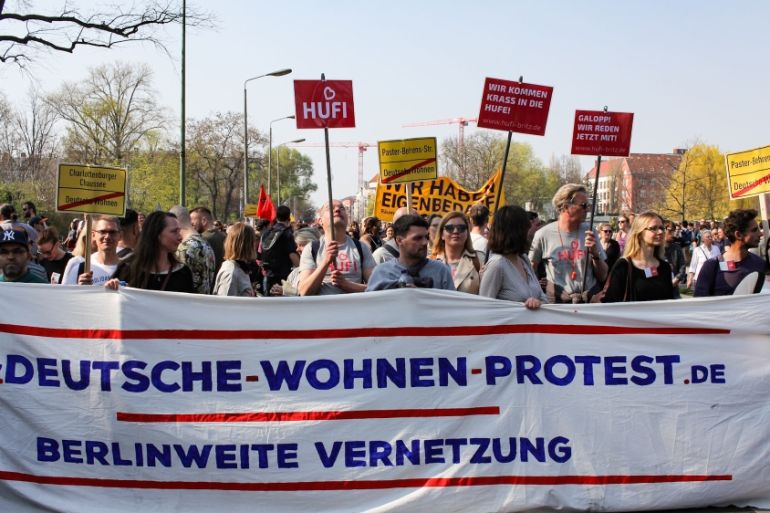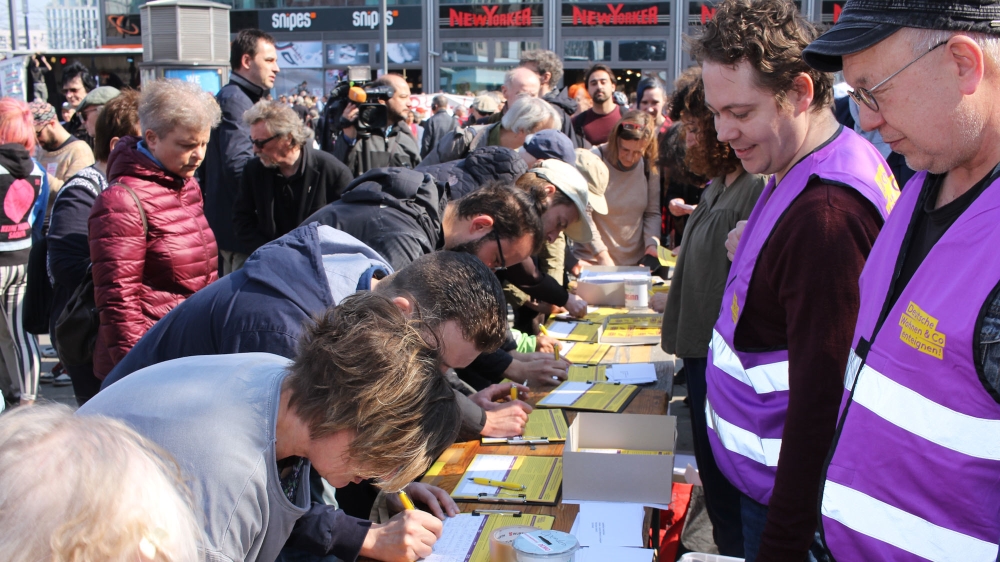Priced out by corporate landlords, Berlin renters fight back
Fed up with skyrocketing rents, Berliners back a controversial plan to expropriate corporate-owned flats.

Berlin, Germany – Last year, documentary filmmaker Felix Gaedtke got the kind of news that renters anywhere in the world would dread.
He received a letter informing him that his new corporate landlord planned to hike his rent by 50 percent to pay for renovations on his building in Neukolln, a borough in southeast Berlin.
Keep reading
list of 4 itemsChina’s economy beats expectations, growing 5.3 percent in first quarter
Inside the pressures facing Quebec’s billion-dollar maple syrup industry
Manipur’s BJP CM inflamed conflict: Assam Rifles report on India violence
Like many once-affordable neighbourhoods in Berlin, Nuekolln has gentrified in recent years, with hipsters and young professionals moving in alongside working-class Germans and Turkish-Germans.
But the transformation has also drawn in companies that buy up former council flats only to raise rents to charge for upgrades that make the buildings they own more profitable, but that price out less-affluent tenants.
Gaedtke and his building neighbours managed to thwart the first attempt by their landlords, WiBE Immobilieninvest GmbH, to increase rents to pay for modernisations. But their battle, which they’ve chronicled online, has continued.
“They are trying all sorts of ways to get us out,” Gaedtke told Al Jazeera. “On the rental market we will never find anything like this, and buying isn’t an option. What other options do we have than to fight?”
WiBE Immobilieninvest GmbH declined Al Jazeera’s request for an interview to comment on the situation.
What other options do we have than to fight?
Skyrocketing rents
Once renowned for being “poor but sexy”, Berlin has seen rents nearly double over the past decade.
In 2018 alone, the average rental cost per metre in the capital of Germany was 11.7 euros ($13.22) – a 13 percent increase over the previous year, according to real estate site Immowelt.
That kind of rent spike can derail a household on a tight budget and turn the hunt for an affordable flat into an experience akin to competitive sport.
But in Berlin, where 85 percent of the population rents the roofs over their heads, it has also inspired a controversial grassroots campaign to nationalise large swaths of the city’s corporate-owned housing stock.
Invoking a constitutional provision that allows private land to be converted into public ownership, the campaign aims to expropriate some 200,000 former council flats sold to large corporations and turn them back into social housing.
Since early April, the campaign’s organisers, Deutsche Wohnen & Co Enteignen (DWE), have been collecting signatures for a petition to compel the local government to hold a citywide referendum on the proposal.
Friday, organisers presented their first batch of 77,001 signatures to the Berlin Senate for Home Affairs and Sport- far in excess of the 20,000 required for the governing body to consider their request for a referendum.
If the referendum is held and ultimately becomes successful, it would mark a radical shake-up in a major European residential rental market that some activists hope could reverberate beyond Berlin and even establish housing as a human right.

“We want this to be the beginning of a more social housing market in Berlin, and the only way to do that is to increase and make thriving public stock to work against the market,” DWE campaigner Thomas McGath told Al Jazeera.
McGath, an American copywriter who has lived in Berlin for the past six years, argues that big companies simply aren’t motivated to build affordable housing.
“There are lots of apartments being built, but only for the upper-price segment, which has absolutely no effect on average rents,” he said. “Larger investment funds have much more of an incentive to kick people out, raise the rents or increase the utility costs. They are exhausting any sort of judicial tools and methods to get around this rising rent storm.”
We want this to be the beginning of a more social housing market in Berlin
Haven to nightmare
A combination of population growth and poor policy decisions have turned Berlin’s formerly renter-friendly housing market into a renter’s nightmare.
The German capital sold off huge chunks of public housing stock to private companies in the early 2000s. But a housing crunch began to take shape the following decade, as the city’s relatively strong economy post-financial crisis attracted droves of students and young professionals.
Berlin’s population grew on average by almost 50,000 people per year between 2011 and 2016, according to government figures. And that excludes the thousands of refugees who arrived during the height of the European migrant crisis.
A so-called “rent brake” was introduced in 2015 to cap rent increases on new leases at 10 percent above what the local government considered fair. But landlords have found ways around the measure.
“There have been a lot of changes in the city, a high level of immigration and the German economy was doing better than expected,” Ralph Henger, a senior economist for housing policy and real-estate economics at the Cologne-based German Economic Institute, told Al Jazeera. “Politicians were sleeping and didn’t prepare.”
In such a climate, it is the city’s most vulnerable – pensioners on fixed incomes, the unemployed, and refugees – who are being hit hardest.
Some 40 percent of Berliners between the ages of 45 and 55 are unlikely to be able to afford to stay in the city once they retire, according to one recent study,
A 69-year-old woman who asked not to be named told Al Jazeera that she has lived in her current flat in Alexanderplatz, in central Berlin, since 2001. She became an activist with DWE’s sister campaign group after being hit with a rent increase, and now more than half of her pension goes towards rent.
Compensation is contentious
The plan to re-nationalise a portion of Berlin’s housing stock includes a provision to compensate corporate landlords for the value of their expropriated flats.
But there’s stark disagreement over what constitutes a fair price.
The Senate of Berlin estimates it would cost the city between 26 billion and 36 billion euros ($29.3bn to $40.6bn) to renationalise 240,000 apartments. But the DWE campaign reckons it would cost around 18 billion euros ($20.3bn).
“Senate officials calculate the cost with current market prices, while campaign members argue that the city doesn’t have to pay the full market price,” said Henger. “The prices below the market would not be in line with German law, so in my opinion, only the market price calculations are accurate.”
Opinion among Berlin officials is divided, with the senior partner in the governing coalition, the Social Democrats, remaining cold to the campaign. And the plan to expropriate housing isn’t the only one being floated as a possible solution to soaring rents. Next week, the Berlin Senate is set to consider a proposal that would freeze rents in the capital for five years starting in 2020.
For its part, the biggest corporate landlord in the city, Deutsche Wohnen & Co (whose name appears in the DWE campaign and literally translates as “expropriate Deutsche Wohnen & Co”) has argued that expropriation doesn’t help tenants and that long delays with the government-approval process are slowing the construction of new apartments.
Meanwhile, Gaedtke has mixed feelings about renationalising portions of the city’s private housing stock, but he has signed the petition, hoping it will empower Berliners like himself.
“I hope the campaign creates a larger discussion about this being a much bigger systemic problem, where we have a capitalist system that commodifies living,” he said. “The question is ‘What kind of city do we want to live in?’. And that should be decided by people who live in the city, not outside investors.”
This article is part of AJ Impact’s ongoing series about housing and its many complex business, technological, and political dimensions. A global demographic shift is taking place as enormous numbers of people migrate to urban centres looking for places to live and work. Click here to read past articles about housing in New York City, Lagos, Nigeria or Chicago, US.